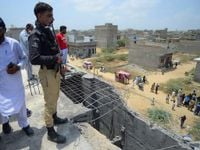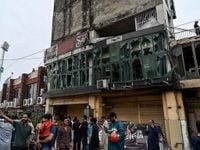Tensions between India and Pakistan have escalated dramatically in recent days, as both nuclear-armed nations find themselves on the brink of military confrontation. The situation reached a boiling point with the launch of India's "Operation Sindoor" on May 7, 2025, a series of missile strikes targeting what India described as "terrorist infrastructure" in Pakistan-administered Kashmir and Punjab province.
The strikes were in retaliation for a deadly attack in Kashmir on April 22, which claimed the lives of 26 civilians, predominantly Hindu tourists. India has accused Pakistan of harboring the attackers, a claim that Islamabad vehemently denies. The Indian government stated that its military action was focused on nine sites believed to be involved in planning attacks against India, asserting that no military facilities were targeted. However, Pakistan characterized the strikes as "an act of war," claiming that at least 31 people died in the assaults.
The conflict has seen a rapid escalation of hostilities, with both sides accusing each other of initiating attacks. Reports indicate that Pakistan's military has shot down 77 Indian drones, while India claims to have intercepted multiple Pakistani drone incursions. The Indian Defense Ministry reported that an armed drone targeted a civilian area in the border town of Ferozpur, injuring a family, while both countries have engaged in artillery exchanges along the Line of Control (LoC).
As the violence continues, the international community has expressed deep concern over the escalating tensions. World powers, including the United States and China, have called for restraint and urged both nations to engage in dialogue. U.S. Secretary of State Marco Rubio has been in contact with leaders from both countries, emphasizing the need for immediate de-escalation. Meanwhile, President Donald Trump has stated his desire for both nations to resolve their differences peacefully.
In India, the strikes have been met with a wave of nationalistic fervor, with many citizens expressing pride in their military's actions. News outlets have broadcasted forceful headlines, celebrating the operation and portraying it as a necessary response to terrorism. However, this hypernationalism has also led to increased censorship, with reports of the Indian government blocking thousands of social media accounts to control the narrative surrounding the conflict.
On the ground, the situation remains volatile. Reports from Jammu indicate blasts and drone sightings, while blackouts have been imposed in several cities along the western and northern frontiers. Civilian casualties have been reported, with at least four civilians killed and many more injured due to cross-border shelling.
In Pakistan, the public response has been one of outrage, particularly as the strikes reportedly resulted in civilian deaths, including women and children. There are fears that the conflict could spiral out of control, with calls for retaliation from the Pakistani military. The Pakistani government has lifted a ban on social media platforms to allow for the expression of public sentiment, which has been largely anti-India.
As both countries prepare for possible further military action, cricket tournaments have been affected, with the Pakistan Super League being relocated to the United Arab Emirates due to safety concerns. International airlines have canceled flights to and from Pakistan, and schools in Punjab province and Islamabad remain closed as a precautionary measure.
The ongoing conflict has raised alarms among community leaders in regions with significant Indian and Pakistani diasporas, who are urging unity and calm amidst rising tensions. Local leaders in the UK have called for restraint and have organized interfaith meetings to promote solidarity among communities affected by the conflict.
As the situation develops, the potential for further escalation remains high. The international community watches closely, hoping for a resolution that avoids further loss of life and restores peace in the region. The stakes are particularly high, as both nations possess nuclear capabilities, and any miscalculation could have catastrophic consequences.
In summary, the conflict between India and Pakistan has reached a critical juncture, with military actions, nationalistic sentiments, and international concerns converging in a volatile mix. The path forward is uncertain, and the world holds its breath as both nations navigate this precarious moment in their long-standing rivalry.





